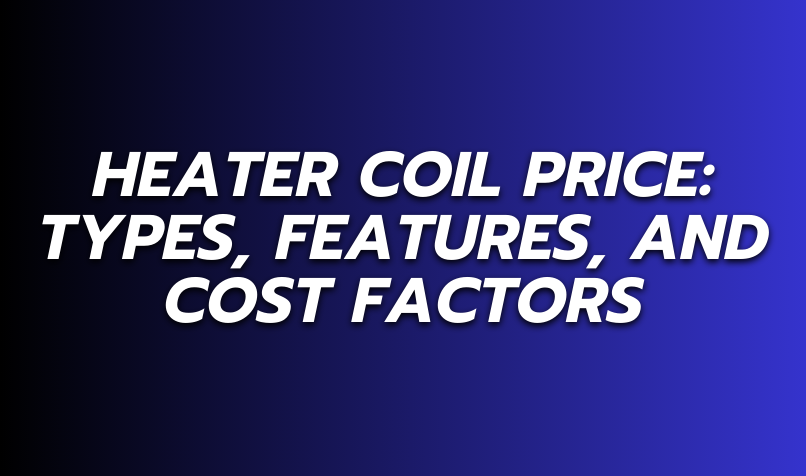
When it comes to industrial heating solutions, heater coils play a pivotal role in ensuring efficiency and reliability. Whether you're looking to heat air, water, or other materials, understanding the types, features, and cost factors of heater coils can help you make an informed decision. In this blog, we will break down the essentials of heater coil price, the different types available, and the key features that influence their cost.
Heater coils come in a variety of types, each suited for specific applications. The most common types include:
Electric heating coils are the most common type of heater coils used in industrial applications. These coils use electrical resistance to generate heat and are ideal for precise heating in various environments. Electric coils are commonly used in ovens, water heaters, furnaces, and more. They offer flexibility in design and can be tailored for various temperature ranges and sizes.
Immersion heater coils are designed to be submerged in the material they heat. These coils are commonly used in water heating, oil heating, and chemical processing. The direct heat transfer between the coil and the fluid or material being heated ensures high efficiency and reliability. Immersion heaters are known for their effectiveness in industries requiring rapid heating of large volumes of liquids.
Cartridge heater coils are used for applications requiring localized heating. They are compact and can be inserted into holes or other confined spaces in machinery, making them ideal for metal forming, plastic molding, and other industrial processes. Cartridge heaters are typically made of high-grade materials, offering durability and resistance to wear.
Finned heater coils are designed to increase the surface area for heat transfer. These coils are typically used in air heating applications such as air conditioning systems, ovens, and dryers. The fins help distribute the heat more effectively, improving efficiency by enhancing the heat exchange process. Finned coils are essential when dealing with applications that require the rapid distribution of heat across a large area.
When choosing a heater coil, several key features determine its suitability for a particular application:
The material used in heater coils plays a significant role in their performance and durability. Common materials include:
Watt density refers to the amount of power output per unit area of the coil. A higher watt density will generate more heat, but it can also lead to faster wear and tear on the coil. Choosing the right watt density is critical to balancing performance and longevity. For instance, high watt density coils are ideal for applications requiring quick heating, but they might need to be replaced more often in harsh conditions.
Heater coils come in various voltage and wattage ratings. It’s crucial to select the right combination based on the heating requirements of your application. Overloading or underusing the coil can lead to inefficiency, overheating, or damage to the system. Be sure to choose the appropriate voltage and wattage for optimal performance.
The lifespan of a heater coil is directly influenced by factors such as the material, watt density, and operating conditions. To ensure longer-lasting performance, it's important to select coils with protective coatings or those made from corrosion-resistant materials. Regular maintenance can also help extend the lifespan of your coils.
The price of heater coils can vary significantly based on several factors:
Heater coils made from premium materials like stainless steel or nickel-chromium alloys will generally cost more than those made from more affordable materials like copper. The material’s ability to withstand extreme temperatures and resist corrosion directly impacts its cost. For example, nickel-chromium alloy coils are ideal for high-temperature environments but come at a higher price due to their superior performance and durability.
Larger coils or custom designs typically come with a higher price tag due to the increased material cost and labor required for production. Specialized designs, such as finned or cartridge heater coils, often cost more due to the engineering involved in their creation. Custom designs tailored to specific industrial needs can also influence the price.
The higher the power rating of the heater coil, the more it will cost. A coil with a higher wattage or voltage capacity typically offers better performance and is suited for more demanding applications, thus driving up the price. For example, coils designed for industrial ovens with higher power ratings may be more expensive than smaller coils for household water heaters.
Reputable manufacturers like Powerpack Electricals ensure the production of high-quality heater coils. Established brands with a reputation for reliability, quality control, and customer service may charge a premium. However, this investment often results in longer-lasting products and superior performance, offering better value over time.
Bulk purchases or long-term contracts with manufacturers can lead to significant discounts, lowering the per-unit cost of heater coils. Conversely, smaller orders or custom coils often incur higher costs due to limited production runs. If you’re planning to purchase heater coils in large quantities, negotiating a bulk discount can provide significant savings.
Heater coil prices vary based on the factors outlined above. For instance, a standard electric heating coil may cost anywhere from INR 500 to INR 3,000 depending on the material and wattage. Custom and high-performance coils, such as those used in heavy-duty industrial settings, could cost upwards of INR 10,000. Always ensure you’re purchasing from a trusted manufacturer to get the best value for your investment.
Choosing the right heater coil for your industrial application requires understanding the different types, features, and cost factors. By considering the material, wattage, and durability, you can make an informed decision that fits both your heating needs and budget. With Powerpack Electricals, you can rest assured that you're investing in high-quality heating solutions backed by industry expertise.
For more information on our range of heater coils and other industrial heating elements, feel free to contact us at Powerpack Electricals. Let us help you find the perfect solution for your business.